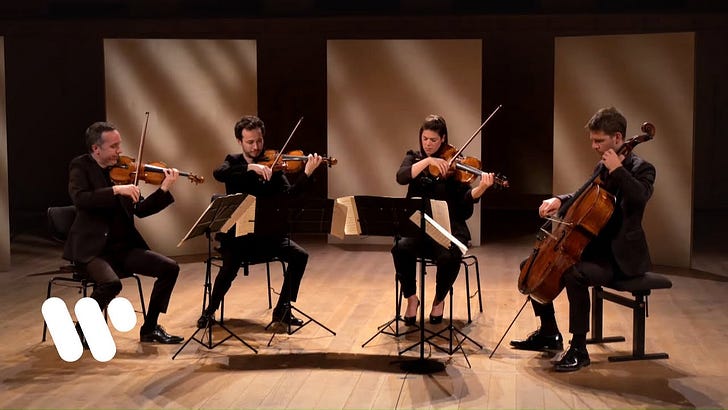Another (spiritual) palate cleanser
Last week, middle Beethoven. This week, something even more supernal.
There are many mountain peaks in (so-called) classical music. Some are almost too familiar (Beethoven’s Fifth, the Ride of the Valkyries, the William Tell Overture), but even all those have treasures to disclose to anyone willing to listen hard for them.
For me, one irony of the loftiest peaks in the musical literature is that, if anything, they seem the most accessible, with little or no effort to plumb “what am I hearing here?” I was intimidated all my life by Bach’s Saint Matthew Passion — until I got to know it as one of the singers in a live performance, when it turned out the only thing to fear was undergoing one of the most profound experiences of my life.
Beethoven’s late string quartets — some of the last music he ever wrote, including the very last movement from his pen — is among the most remarkable in all music for one simple reason: although it’s a commonplace to call them by the most laudatory and even worshipful adjectives, they all made sense to me the first time I heard them as a teenager (except for the Große Fuge). And the more I listened, the more gorgeous they grew, and the deeper and vaster the emotions they elicited, and still do.
The first of the bunch, Op. 127 in E-flat (number 12), is perhaps the most accessible of them all — except possibly the “last”, Op. 135 in F, which is also the shortest. (“Last” in quotation marks because Beethoven wrote a new finale for Op. 130 last of all, to replace the Große Fuge at his publisher’s request.) There is very little new vocabulary here, few figurations that baffle as to where the downbeat is, or anything like that.
Some hear in these quartets foreshadowings of 20th-century avant-garde sounds and rarefied, stratospheric sonic experiments. I confess I only hear those in the Fuge, which can still baffle me in the most uplifting way. I do hear foreshadowings (because he did inspire later music) of works like Bedrich Smetana’s first string quartet, “From My Life,” which is some of the most passionate and stirring music ever written. In these late quartets, though, what I hear above all is the distillation, the crowning achievements of Beethoven’s efforts to convey an emotion of exaltation and (at last) a supernal joy.
If you can come to the end of this quartet’s second (slower) movement with dry eyes, I salute your resolve. For me, this is the micro version of the Ninth Symphony’s slow movement, and just as moving.
Regardless, I hope everyone will enjoy some parts of this performance and that the enjoyment will invite you to repeated listenings. The more you hear, I think, the more you’ll feel.
If you like, let me know, and there will be more to come. (Even if you don’t like, I’ll make the offers.)



